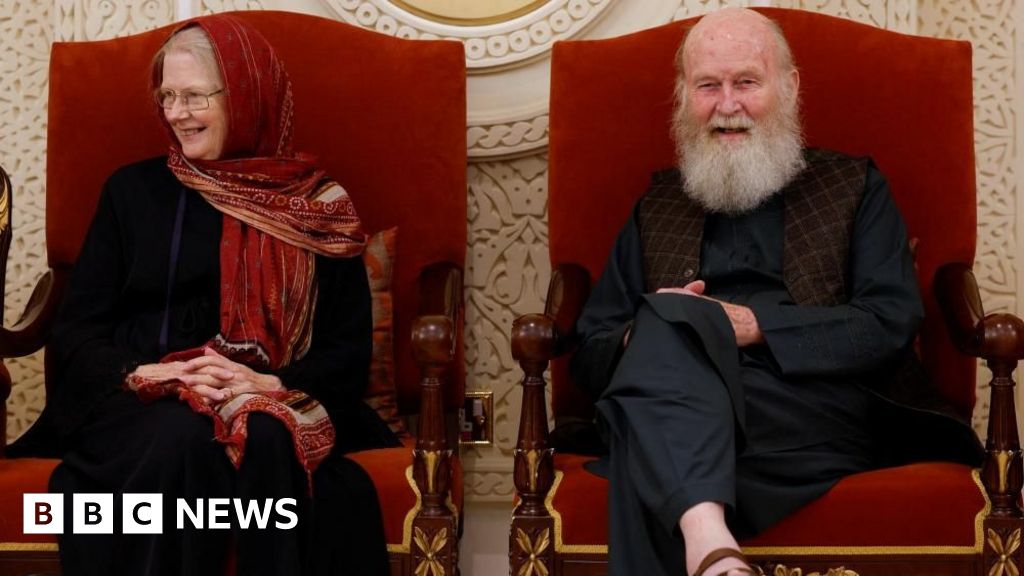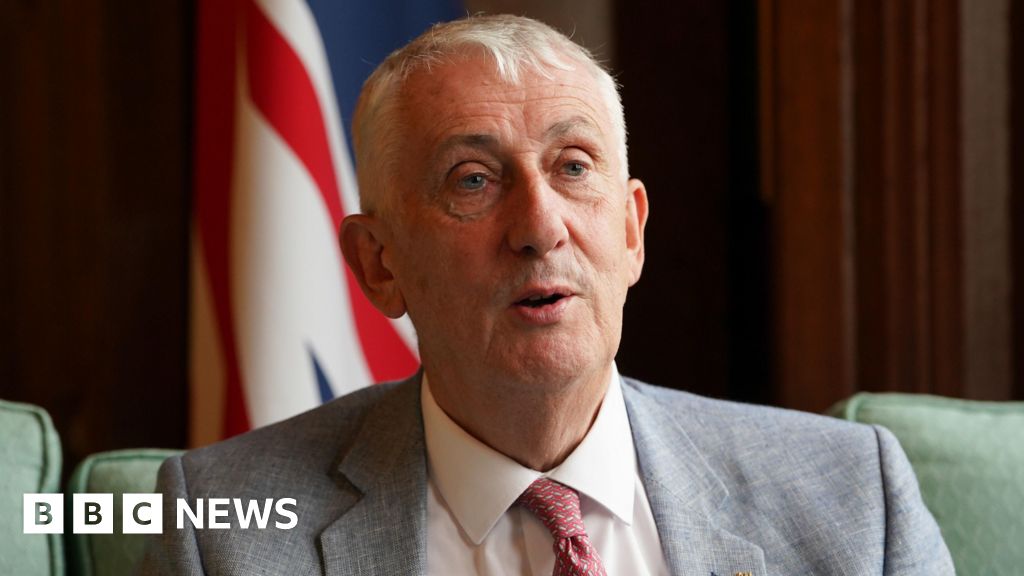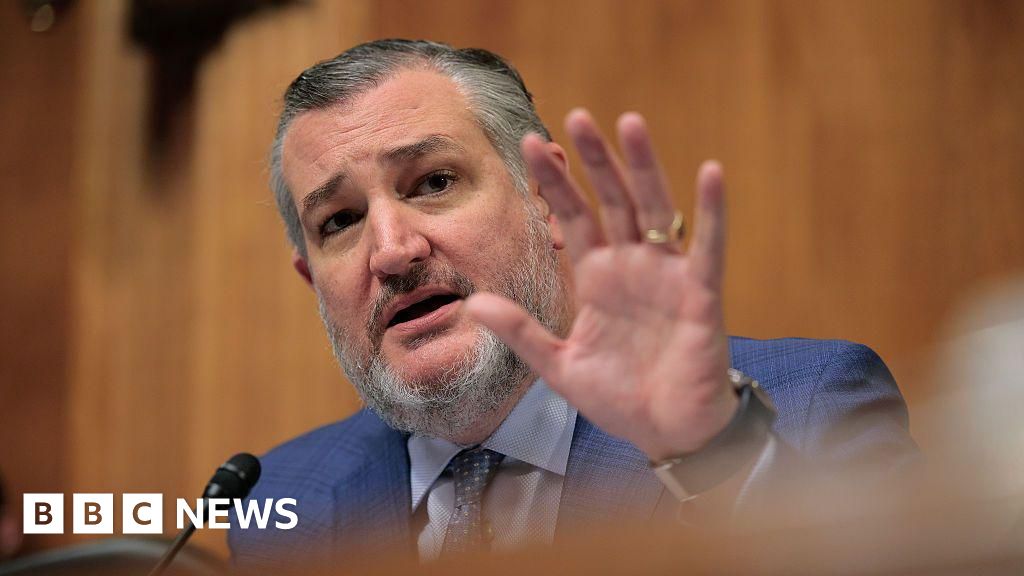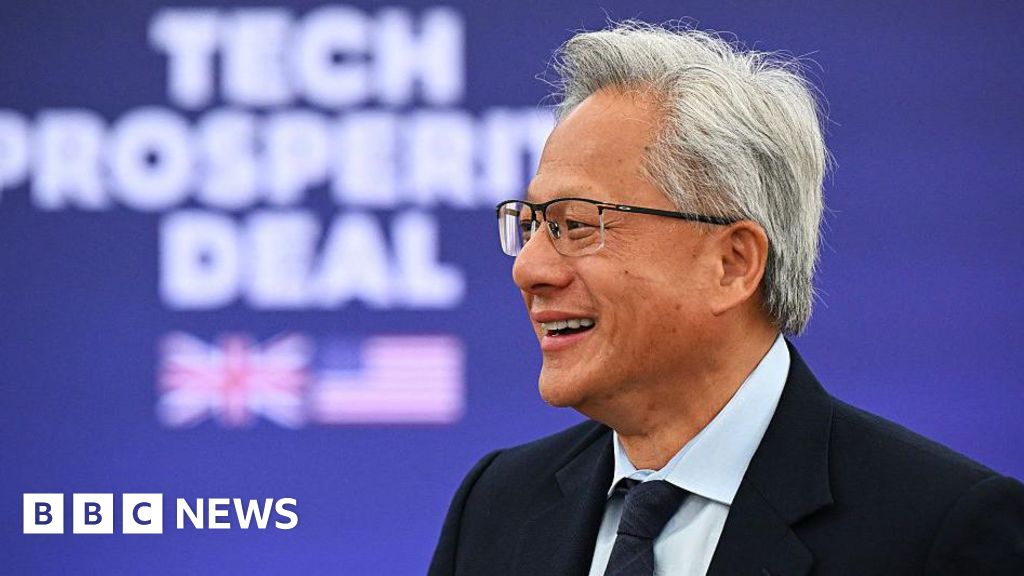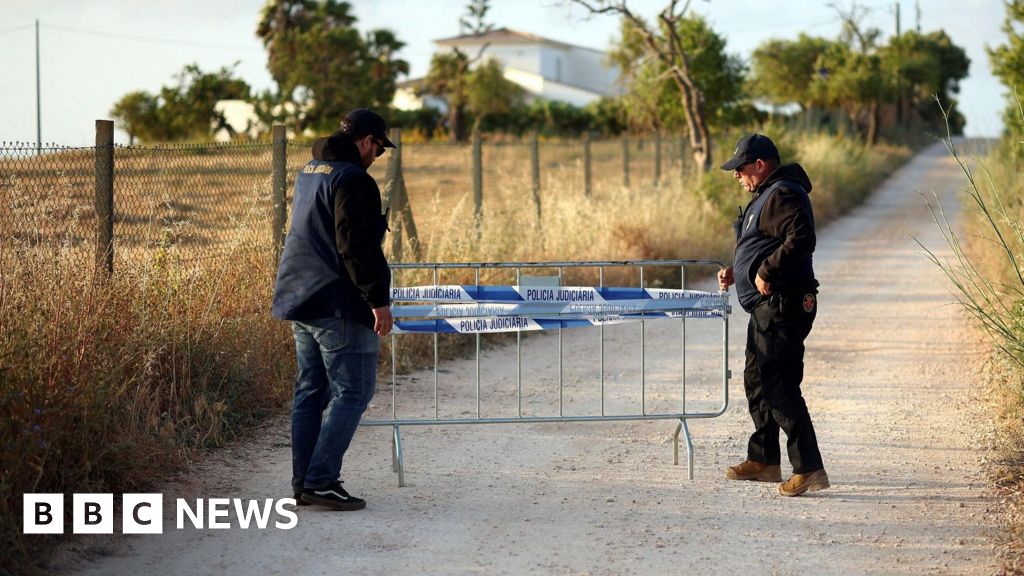
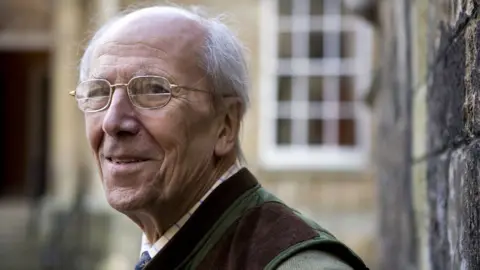 Getty Images
Getty Images
Norman Tebbit, who has died at the age of 94, was at the heart of Margaret Thatcher's political revolution.
He was a man whose philosophy of self-reliance formed the core of his political beliefs.
An able and conscientious politician, his plain speaking on immigration and Europe endeared him to the Tory faithful, and he was once spoken of as a possible party leader.
And while Lord Tebbit's uncompromising views often enraged his political opponents, he was unmoved by the less-than-flattering names they bestowed upon him.

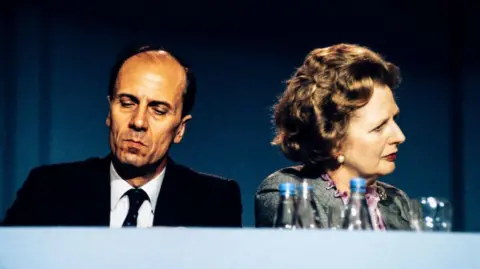 Getty Images
Getty Images
Norman Tebbit was at the heart of Margaret Thatcher's political revolution in the 1980s.
Norman Beresford Tebbit was born on 29 March 1931 in the working-class suburb of Ponders End in north London.
His father, a manager in a jewellery and pawnbroker's business, had progressed sufficiently in life to be buying his own house.
However, prosperity was not to last.
The manager's job disappeared in the economic depression, and the family moved to what became a series of short-term lets in Edmonton.
Tebbit's father found employment as a painter, although not before he had travelled the streets looking for work on a bicycle that was later became to become famous.

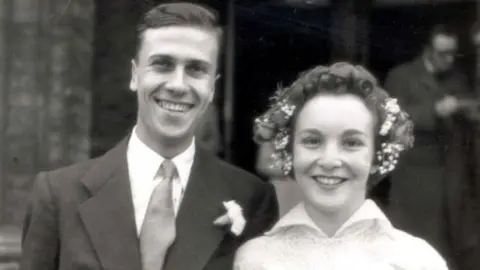 Norman Tebbitt
Norman Tebbitt
Norman and Margaret Tebbit on their wedding day in 1956
By the time the young Norman arrived at Edmonton County Grammar School, he had already developed his interest in Conservative politics.
"I felt you should be able to make your own fortune," he said. "You should be master of your own fate."
Leaving school at 16, he joined the Financial Times where, much to his annoyance, the operation of the closed shop forced him to join the print union, Natsopa.
After two years, he went to do his National Service with the RAF where he gained a commission as a Pilot Officer.
However, he decided that his political ambitions were not compatible with a service career so he left to sell advertising with a company run by a family friend.

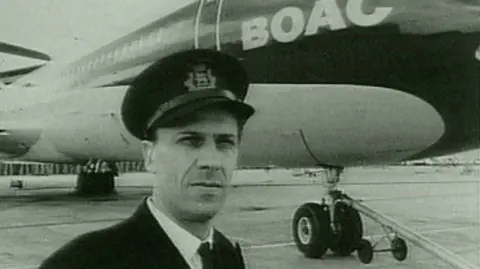 PA Media
PA Media
As a pilots' union activist he was a thorn in the side of BOAC management
He had not lost his love of flying and he signed up with the Royal Auxiliary Air Force as a part-time pilot.
He narrowly escaped death when his Meteor jet failed to take off and ploughed off the end of a runway in Cambridgeshire.
Trapped in the burning plane, Tebbit managed to force open the cockpit canopy. His aircraft was completely destroyed.
Sixty years later, doctors told him that he'd lived with a cardiac arrhythmia for most of his life. It was possible that he had slipped unconcious on the runway.
In 1953, he joined the British Overseas Airways Corporation (BOAC) as a pilot and, three years later, married a nurse called Margaret Daines.
For the next 17 years, he juggled his flying with a career as an activist for the British Airline Pilots' Association.
The man who would later be instrumental in tackling Britain's trade unions became a scourge of the airline's management.

 Getty Images
Getty Images
Norman Tebbit first became an MP in 1970
The election of a Labour government in 1964 spurred him towards politics.
He was eventually selected as the Conservative candidate for Epping, a seat once held by Sir Winston Churchill.
He won his chance after giving a characteristically robust Tebbit speech.
It advocated selling off state-owned industries, trade union reform, immigration control and an attack on the so-called permissive society.
The seat then contained the Labour stronghold of Harlow, but an energetic campaign, coupled with the overconfidence of the sitting Labour MP, saw Tebbit victorious in 1970.

 Getty Images
Getty Images
Norman Tebbit rapidly became disillusioned with Sir Edward Heath's style of leadership
He quickly became disillusioned with Ted Heath's leadership.
Tebbit felt that the radical platform on which the Conservatives had won the election was being ignored, in favour of a more consensus style of politics.
But in 1972, he accepted a job as parliamentary private secretary to the minister of state for employment, the first rung on the ladder to ministerial office.
His new post was not to last long.
Angered by Heath's adoption of a prices and incomes policy - a clear breach of a manifesto promise - and his failure to curb union influence, Tebbit resigned from the government.

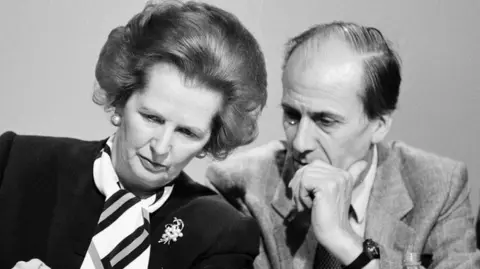 Getty Images
Getty Images
Norman Tebbit's appointment as Employment Secretary signalled a tougher approach to the Trade Unions
Three months later, the Conservatives were out of office.
Tebbit, now the member for the newly created seat of Chingford, would gain a reputation as a thorn in the side of Labour ministers.
In 1975, he clashed with the Employment Secretary Michael Foot over the government's failure to condemn the dismissal of six power station workers.
The men had refused to join a trade union following the imposition of a new closed shop agreement at the plant.
Tebbit revelled in his ability to get under the government's skin.
"I was quite amused to find that, as a maverick backbencher with no formal standing, I could lure ministers into wasting their time, and fire power, on such an unimportant target," he said.
Foot fired back, famously comparing Tebbit to a "semi-house-trained polecat" during a debate on parliamentary business.

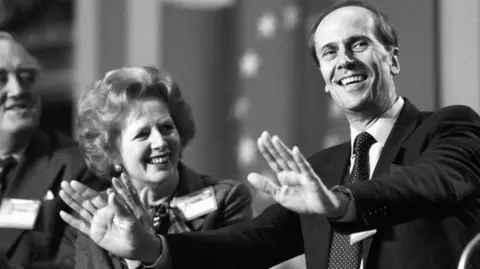 PA
PA
He became a favourite at Conservative Party conferences
When the Conservatives won the 1979 election, Margaret Thatcher appointed Tebbit as an under secretary of state at the Department of Trade.
Within 18 months, he was employment secretary, a move that signalled the government's intention to take a tough line on industrial relations.
In the autumn of 1981, with three million unemployed and with riots blighting a number of inner city areas, Tebbit made the speech for which he will always be remembered.
Addressing the Conservative Party conference in Blackpool, he strayed from his prepared text to remember how his father had reacted to his own unemployment.
"I grew up in the '30s with an unemployed father. He didn't riot. He got on his bike and looked for work, and he kept looking till he found it."
The trade unions and the labour movement were outraged, claiming that Tebbit had told the unemployed to "get on your bike".
But the education secretary insisted his emphasis had been on condemning the riots.

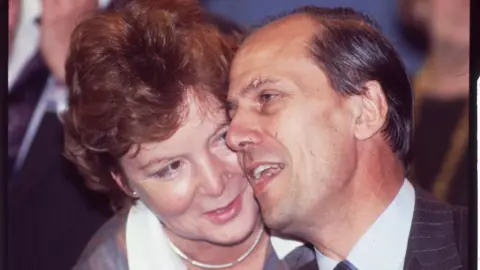 Getty Images
Getty Images
Norman and Margaret Tebbit at the 1983 Conservative party conference. A year later, they were both badly injured in a terrorist attack
His 1982 Employment Act raised the level of compensation for workers dismissed for refusing to join a union.
It also made any closed shop agreement subject to regular ballots and removed the immunity of trade unions from civil action if they authorised illegal industrial action.
Tebbit later claimed that this was "my finest achievement in government".
In 1983, he became trade and industry secretary, following the resignation of Cecil Parkinson over an extra-marital affair.
During his tenure, he presided over the Thatcher government's privatisation programme and was instrumental in encouraging foreign investors to Britain, not least the establishment of a Nissan car plant.
But the IRA bomb which exploded in Brighton's Grand Hotel during the 1984 Conservative conference changed his life forever.


He and his wife were badly injured in the 1984 Brighton bombing
The attack killed five people and injured more than 30 others. He and his wife were trapped under tons of debris.
They laid together, holding hands, waiting for help. Tebbit gave Margaret a message to give to their children, in case he died.
He was left with a broken shoulder blade, fractured vertebrae, a cracked collar bone and needing plastic surgery - but was back at his desk within three months.
Margaret was less fortunate.
As a result of her injuries, she remained paralysed and faced months of hospital treatment. She returned home in a wheelchair and the Tebbits' domestic life had to adapt accordingly.

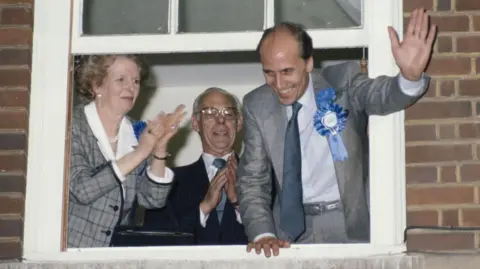 Getty Images
Getty Images
Norman Tebbit celebrates the Conservative party's 1987 election victory, watched by Margaret and Denis Thatcher
Following a cabinet reshuffle in the autumn of 1985, he left the DTI to become Conservative Party chairman.
He threw himself into rebuilding a moribund organisation, launching a membership drive and preparing the party for the next election.
Tebbit used the 1986 Conservative conference to launch an election campaign in all but name, under the slogan, The Next Move Forward.
Margaret Thatcher's popularity rating was beginning to slide, and some commentators began talking about the succession.
Polls suggested that Norman Tebbit might be a popular choice in a future leadership contest, which made relations with the prime minister difficult.
In the end, the 1987 election resulted in a Conservative landslide.

 Getty Images
Getty Images
Lord Tebbit became a powerful voice of euro-scepticism from outside the House of Commons
Tebbit left the cabinet after the election to look after his wife. But his ability to create controversy had not deserted him.
In 1990, he suggested that a test of the willingness of ethic minorities in Britain to assimilate was to see if they supported the England cricket team or the side from their country of origin.
He turned down an invitation from Thatcher to return to the government as education secretary, but steadfastly supported her when her leadership was challenged and she was eventually forced from office.
He decided not to seek election in 1992, and was created a life peer as Baron Tebbit of Chingford.

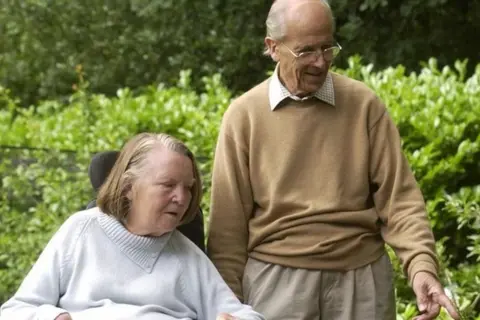
He devoted many years to looking after his wife
He was not content to sit quietly in the Lords.
He embarrassed new Prime Minister John Major with a show-stopping appearance during the 1992 party conference debate on Europe, when he lambasted the decision to sign the Maastricht Treaty.
He later criticised the Conservative Party's move to a moderate, right of centre position, saying this allowed UKIP to hoover up the political right.
In 2009, he published The Game Cook which instructed readers on the best way to cook game, after his local butcher told him that none of his customers knew how to prepare a pheasant.
Having campaigned for Brexit, he grew impatient with Theresa May's negotiations with Brussels - accusing the government of "thinking of nothing but the rights of foreigners".

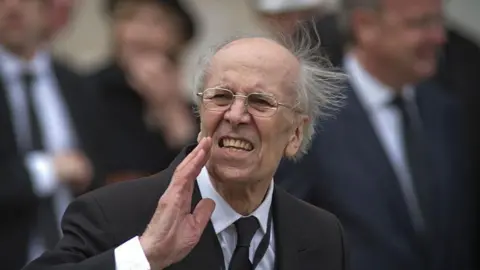 Getty Images
Getty Images
Lord Tebbit calls to somebody in the crowd after Lady Thatcher's funeral in 2013
In 2020, his wife Margaret died, having suffered from Lewy Body Dementia.
Two years later, he made his final appearance in the House of Lords, after a 52-year parliamentary career.
Lord Tebbit's working-class credentials and dry Conservative ideology made him an influential figure throughout the Thatcher years and beyond.
The satirical puppet show, Spitting Image, portrayed him as a leather-clad bovver boy, the enforcer of the Iron Lady's doctrine.
He believed that homosexuals should not have senior cabinet posts, thought foreign aid fuelled corruption, and that too many immigrants fail to integrate.
He helped move the Conservative party from one-nation centrism under Sir Edward Heath, to a position where it favours a small state, controlled immigration and life outside the European Union.
One academic commented: "Although Thatcherism was the political creed of Essex Man, it was Norman Tebbit who was perhaps the public face or voice of Essex Man, and articulated his views and prejudices."
.png)
 2 months ago
29
2 months ago
29



